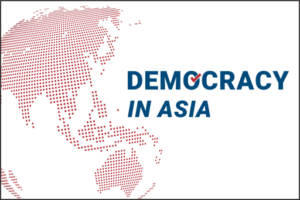 Since the late 2000s, regional intergovernmental frameworks and NGO networks have begun to emerge in Asia, demonstrating commitment to the norms and values of democracy, notes Maiko Ichihara, Associate Professor at Hitotsubashi University, Japan, and Visiting Scholar at the Carnegie Endowment for International Peace.
Since the late 2000s, regional intergovernmental frameworks and NGO networks have begun to emerge in Asia, demonstrating commitment to the norms and values of democracy, notes Maiko Ichihara, Associate Professor at Hitotsubashi University, Japan, and Visiting Scholar at the Carnegie Endowment for International Peace.
While intergovernmental frameworks have not yet moved beyond verbal commitment, civil society has been steadily forming and developing cross-border networks, she writes for the Brookings institution. The four main drivers for institutional formation are:
1) the central role of small rising democracies motivated to consolidate their democratic regimes;
2) the influence of institutional developments in other regions;
3) the role of civil society actors; and
4) the rise of China as an authoritarian superpower.
A new development is emerging as well, Ichihara adds:
In response to the democratic backsliding in Asia, the National Endowment for Democracy (NED), the Center for Strategic and International Studies, and the Annenberg Foundation Trust at Sunnylands, in collaboration with Asian democrats, have convened a new Track II democracy dialogue. July 2020 saw the release of “The Sunnylands Principles on Enhancing Democratic Partnership in the Indo-Pacific Region” which set out the democratic values shared by participants. Asian participants in this process include former high-ranking officials in the governments and judiciary of India, Indonesia, Japan, the Philippines, and South Korea, who are currently working actively with civil society. RTWT







